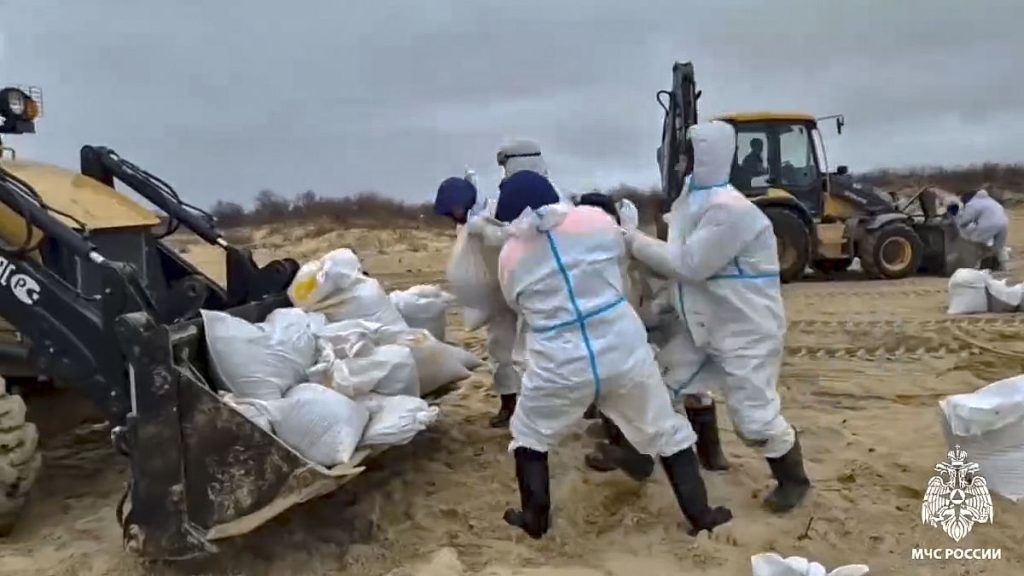The Kerch Strait, a vital maritime passage connecting the Sea of Azov to the Black Sea, and a focal point of the ongoing Russia-Ukraine conflict, has been the site of a recent environmental catastrophe. A fuel oil spill, originating from two stricken tankers approximately three weeks ago, has wreaked havoc on the delicate ecosystem, causing the death of at least 32 dolphins and contaminating vast stretches of coastline. The incident, which unfolded near Sevastopol, on the southwestern coast of the occupied Crimean Peninsula, has prompted emergency declarations in both Crimea and Russia’s Krasnodar region. The spill highlights the vulnerability of this strategically important waterway and underscores the potential for human activity to disrupt the fragile balance of marine life.
The environmental impact of the spill has been devastating, particularly for the local dolphin population. The Delfa Dolphin Rescue and Research Centre has linked the deaths of at least 32 dolphins to the fuel oil contamination. While a total of 61 deceased cetaceans have been recorded since the incident, the condition of the remaining 29 suggests their demise predates the spill. The majority of the dolphin fatalities belong to the endangered Azov species, further exacerbating the ecological consequences. The center believes most of these dolphins likely perished in the immediate aftermath of the spill, with the sea continuing to wash their bodies ashore. This tragic loss underscores the acute sensitivity of marine mammals to oil pollution and the long-term repercussions for their populations.
The spill’s impact extends beyond marine life, impacting the shoreline and requiring extensive cleanup efforts. Russian authorities have declared a state of emergency in both Crimea and the Krasnodar region, mobilizing thousands of personnel and resources to address the contamination. Oil has been detected on several beaches in Sevastopol, necessitating immediate intervention. In the Krasnodar region, a massive cleanup operation is underway, involving almost 7,000 people working to remove contaminated sand and soil. To date, over 96,000 tons of contaminated material has been removed, highlighting the scale of the environmental damage. Initial estimates suggest that as much as 200,000 tons of soil and sand may have been polluted by the mazut, a heavy, low-quality oil product, further emphasizing the magnitude of the disaster.
The Kerch Strait incident has attracted international attention, with Russian President Vladimir Putin labeling it an “ecological disaster.” This acknowledgment underscores the severity of the situation and the potential for long-term environmental consequences. The spill has also reignited tensions between Russia and Ukraine, with Ukraine’s Mykhailo Podolyak, an advisor to President Zelenskyy, describing the incident as a “large-scale environmental disaster” and calling for further sanctions against Russian tankers. This incident highlights the geopolitical sensitivities surrounding the Kerch Strait, which has been a point of contention since Russia’s annexation of Crimea in 2014.
The ecological and geopolitical ramifications of the Kerch Strait oil spill are significant. The loss of marine life, particularly the endangered Azov dolphins, represents a severe blow to the region’s biodiversity. The extensive contamination of the coastline requires a sustained and costly cleanup effort, with long-term impacts on the environment and local communities. Moreover, the incident exacerbates tensions between Russia and Ukraine, further complicating the already fraught relationship between the two countries. The spill serves as a stark reminder of the environmental vulnerabilities of strategically important waterways and the potential for human activity to trigger ecological disasters with far-reaching consequences.
The ongoing cleanup operation in the Kerch Strait will necessitate continuous monitoring and assessment to determine the long-term impacts of the spill. Further investigation into the cause of the incident is crucial to prevent future occurrences and strengthen safety regulations for tankers navigating the strait. The international community must also play a role in supporting the cleanup efforts and ensuring accountability for the environmental damage. This incident serves as a cautionary tale about the fragility of marine ecosystems and the importance of prioritizing environmental protection in areas of geopolitical tension. The Kerch Strait oil spill demands a comprehensive response that addresses not only the immediate environmental crisis but also the underlying issues that contributed to the disaster.














